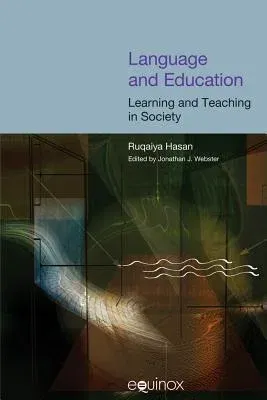Ruqaiya Hasan
(Author)Language and Education: Learning and Teaching in SocietyPaperback, 1 September 2011

Qty
1
Turbo
Ships in 2 - 3 days
In Stock
Free Delivery
Cash on Delivery
15 Days
Free Returns
Secure Checkout

Part of Series
Collected Works of Ruqaiya Hasan
Print Length
428 pages
Language
English
Publisher
Equinox Publishing (UK)
Date Published
1 Sep 2011
ISBN-10
1904768385
ISBN-13
9781904768388
Description
Product Details
Book Format:
Paperback
Country of Origin:
GB
Date Published:
1 September 2011
Dimensions:
23.11 x
15.49 x
2.29 cm
ISBN-10:
1904768385
ISBN-13:
9781904768388
Language:
English
Location:
Sheffield
Pages:
428
Publisher:
Weight:
612.35 gm